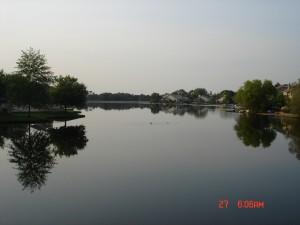
Aquatic maintenance services are a must for some of Terracare’s commercial clients.
For Terracare Associates, landscape contractors based in Littleton, Colo., one way to distinguish its business is to expand the services it offers to its primarily commercial clients. One service it offers is aquatic maintenance.
Terracare, which had $25.5 million in annual revenue in 2012, uses several methods to remove vegetation and maintain water for recreational purpose, including mechanical aquatic harvesters and herbicides to control plants and algae. The service also includes water monitoring.
Terracare’s Aquatic Services Manager Stuart Perry, who’s based in Northern California, says there has been an average growth of approximately 10 percent each year in aquatic maintenance. The combination of water body management with landscaping services is what attracts customers. The main customer prospects are homeowner associations (HOAs) that have lakes or large water features in common areas. Golf courses are another potential client.
“It’s a specialty and it’s a small market,” Perry says. “They’re not constructing lakes at a very steady rate and the natural water ways are varying in existence, so at times it’s hard.”
He notes this service requires specially trained staff. He has more than 25 years of experience in research and specialized aquatic vegetation control programs and has a master’s degree in aquatic plant ecology. He recommends having at least one staff member with aquatic biology or ecology degrees or perhaps a limnology and fisheries background. For Terracare, other aquatic staff members may have biology degrees or backgrounds, but many gain experience on the job.
Routine Maintenance
Terracare sells and operates its aquatics service as a routine maintenance program. Two or three times a year per client, the staff mitigates aquatic weeds one of two ways: with a trailer harvester or small motorboats with spray rigs. The trailers Terracare uses are large capital investment—as much as $100,000 apiece. The boat/spray rig set up costs about $9,000. Chemical treatments also occur two or three times annually. These include various aquatic-labeled herbicides, which combat both submersed and floating aquatic weeds. Algae are another concern; they’re treated with liquid algaecides or copper sulfate crystals.
Terracare also offers monitoring of bodies of water after they have been affected by stormwater. The water is tested for dissolved oxygen levels, pH, conductivity, turbidity and nutrient levels, especially nitrogen and phosphorus.
“Preconceived ideas about how a lake should look and behave are one of the biggest challenges we face,” Perry says. “Out here everybody expects the lakes to look like Lake Tahoe, but stormwater and other factors make that unrealistic. Regular communication with our clients is essential.”
These communications include science-based descriptions/explanations of the biological processes that occur in water bodies and how they affect individual lakes to help the clients understand their systems.
Despite the challenges, Terracare has continued to turn a profit in this area.
Perry estimates the service’s profit margin is slightly higher than landscaping. The company determines aquatic services pricing by considering the labor costs and the materials required. It offers acre and daily rates which are calculated by how much work the machines can do at a profitable rate.
Being able to provide such a distinctive service has helped Terracare’s business to grow—many new customers come from referrals, Perry says.
“Expertise is something that we can offer because we have the correct biologists with the correct degrees,” he says. “[Aquatic maintenance] is vital to our business. It’s an important component because we can combine landscaping and aquatic services as a package and other companies can not.”
Service snapshot
Company: Terracare Associates
Headquarters: Littleton, Colo.
Add-on service: Aquatic maintenance
Why aquatic maintenance?: Offering both commercial landscaping and aquatic maintenance services is an important combination for commercial clients like HOAs.
Equipment needed: Mechanical aquatic harvesters, motorboat-mounted spray rigs and aquatic herbicides, among others.
